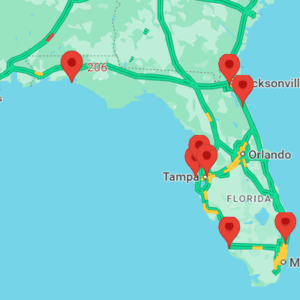Last updated on April 15, 2025
Resolve Land Disputes In Florida With Bernhardt Riley, Attorneys at Law, PLLC‘s Legal Insight
Land disputes in Florida can be challenging and fraught with complexity. Whether you’re a property owner, real estate developer, or investor, Bernhardt Riley, Attorneys at Law, PLLC, offers the legal expertise necessary to address and resolve these disputes. Based in Palm Harbor and with offices in Destin, Tampa and Clearwater available by appointment, our firm is strategically positioned to assist clients across the state with their land dispute needs.
Land disputes can range from boundary issues and easement conflicts to zoning disagreements and adverse possession claims. Our attorneys have a deep understanding of Florida property laws and provide assertive representation tailored to protect your interests. We prioritize clear communication and strategic negotiation to seek resolutions that align with your goals, and we are prepared to litigate vigorously on your behalf when necessary.
From Boundary Disputes To Easements, We Can Advocate For You
Disagreements over the location of a property line and inaccurate legal descriptions of a purchased property often lead to boundary disputes in Florida. Whether the disputes arise from the sale of a property, a fence that has encroached onto a neighboring property, a tree that has been planted or removed, or a new build that is beyond the property line, a professional should be sought out to analyze whether there is an infringement on you or your neighbor’s property, and a determination should be made of how long that infringement has occurred.
Bernhardt Riley, Attorneys at Law, PLLC‘s real estate litigation attorneys are skilled negotiators who can work with you to discover a compromise that can save you both time and money. We can also assist you with a variety of legal concerns and land disputes.
Encroachments
An encroachment occurs when any portion of land above or below the surface beyond what is described in a property’s deed is occupied by an individual. In these cases, there is not an agreement allowing the individual to encroach on your property, nor an easement, judgment, or decree giving title to the encroached land.
Easements
An easement is a legal right given to a person or entity to use property or land belonging to another person or entity for a particular purpose. An easement can be created by a written agreement, established through a deed, by regular usage of the property, by way of necessity, or by license or permission.
Injunctions
A lawsuit for an injunction may be brought in court should a landowner believe that an easement or right of way is being improperly imposed or misused. An injunction will prevent the improper use of the land, and a breach of contract claim may provide for an award of damages. If you are facing an issue that arises from the ownership of your Florida property, call the experienced attorneys at Bernhardt Riley, Attorneys at Law, PLLC, to help you navigate your case.
Covenants
A property may be restricted to certain uses or require specific actions to be taken to the property by the property owner and may often be found in subdivisions and neighborhoods. For example, a restrictive covenant may prevent a property owner from turning a desirable piece of land into a subdivision. The Bernhardt Riley, Attorneys at Law, PLLC, real estate attorneys can help draft a declaration clearly outlining the rights, responsibilities, and restrictions of all parties involved.
Partitions
When joint property owners in Florida are in dispute over the management of the property, or whether or not to actually sell the property, one of the owners may bring a Partition Action against the other owner. A Partition matter is a civil lawsuit that serves to force the sale of the property under §§ 64.011-64.091, Fla. Stat. It’s important to note that those able to bring a Partition action include “any one or more of several joint tenants, tenants in common, or coparceners, against their cotenants, coparceners, or others interested in the lands to be divided.” § 64.031, Fla. Stat., and the lawsuit must be filed in the county where the actual property is located, despite the location of the owners.
Ultimately, the court will decide whether to divide up the property and give each joint property owner a portion of it or whether the subject property should be sold, and will also decide each party’s entitlement to the share of sale proceeds and taking into consideration and the proceeds will be used to satisfy any mortgages, liens, and taxes and distribution will take into account any improvement or contributions made to the property such as mortgage payments or property taxes. Additionally, Florida partition actions take into account attorney’s fees, which are specifically provided for in § 64.081, Fla. Stat.
Secure Your Property Rights With Bernhardt Riley, Attorneys at Law, PLLC
If you need help with a land dispute in Florida, you don’t have to face it alone. Bernhardt Riley, Attorneys at Law, PLLC, is here to provide the legal support and guidance you need. With our knowledge of state laws and dedication to our clients, we strive to achieve favorable outcomes in even the most complex property disputes.
Contact us today to schedule a consultation and discuss your case. Call us at 727-335-3575 or use our online contact form to get started. Whether you live near our main office in Palm Harbor or closer to our offices in Destin, Tampa or Clearwater, our team is ready to help you assert and protect your property rights with confidence.










